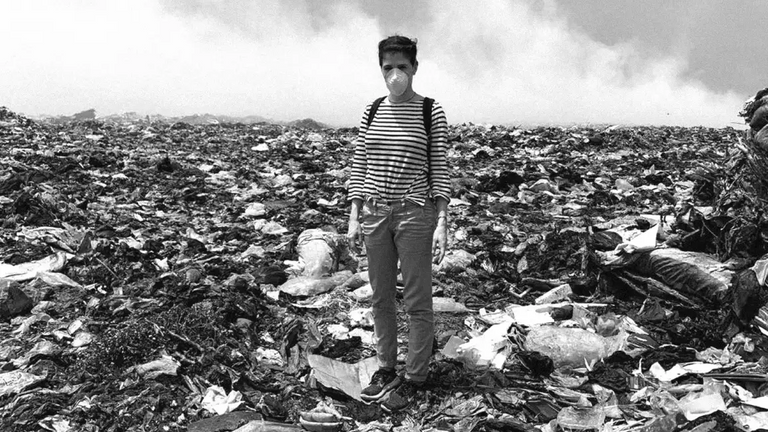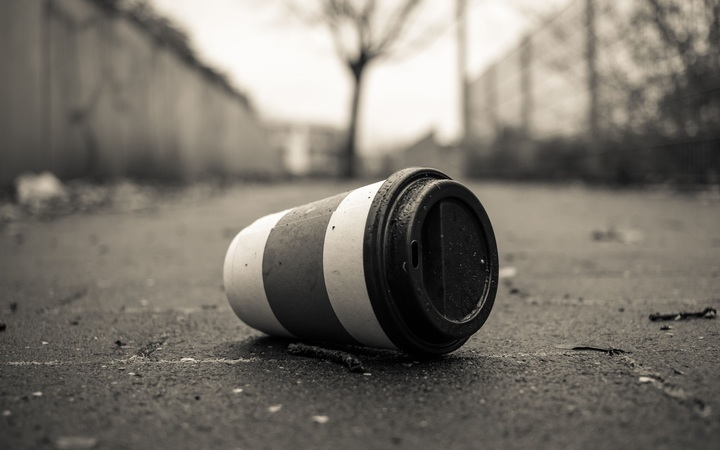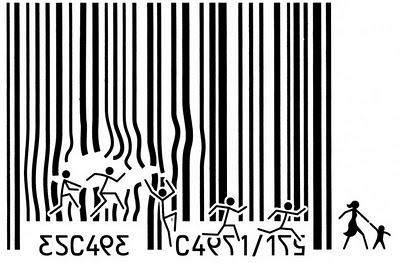In Ghana, market stall owners open up big bales of dead man's white clothes, recycling donations from the west to sell at huge West African markets - some 4 million tonnes in a trade estimated to be worth $4.6 billion. Twenty years ago, traders could bank on unseen bales to make a profit - but now, a vast amount of each bale are stained, torn, and basically unusable, ending up in landfill. According to the above linked article, we're buying over twice the amount of clothes we did twenty years ago, but keeping them for half as long - new clothes become old within two or three wears, either from fast changing fashions or simply because they're very cheaply produced.
An estimated 85 per cent of all textiles go to the dump every year, according to the World Economic Forum, enough to fill Sydney Harbour annually. Globally, that’s the equivalent of one garbage truck of textiles being burned or going into landfill every second.1
Cheap clothes can be so cheap that they don't even make it to charity shops as they become very quickly unwearable. Waste is the business model of fashion. Whilst we shop online for the latest bargain, huge rubbish dumps of textiles catch alight in places like Ghana where thousands of people make their home out of necessity. And if they're not catching alight, they're taking hundreds of years to decompose.

Have you thought about where your old clothes go to die?
But still we buy fast fashion. I've sure as hell been guilty of it - that cute little cheap top that I bought off the internet that lasted all of a month before it started to fray.
And we buy takeaway coffees, even if we know we shouldn't. We're told that the plastic membrane inside of a coffee cup can take 30 years to decompose and even the biodegradable ones end up in landfill and become part of the problem - daily, two million coffee cups end up there. And even the 'keep cup' industry isn't squeaky clean. As a nano influencer on Instagram (having nearly 4k followers) I often get asked if I'd like to buy a product at a discount and model it on my feed (which I never do). More than once it's been about re-usable coffee cups. The conversation goes a little like this:
'I already have one'
'Oh, but did you know that ours come in five different colours?'
'Yes, but I already have one!'
'We can ship you one for free!'
'What, from America?'
'Yes, we are trying to save the planet'
'What, by shipping me a keep cup from the other side of the world on an aeroplane, that I don't need, to model for people who already have keep cups?'
'We're just trying to do our bit for the environment'
'But I already have one'
And I do - one I hope I'll never lose. Even a keep cup takes at least twenty uses before it pays for itself environmentally, and what happens to the ones we grow tired of because we've found a supposedly better one? I don't want to go as far as environmental activist Sarah Wilson who uses a jam jar wrapped in rubber bands from vegetable produce, but I sure as hell am not switching my keep cup on a whim.

My local cafe has introduced a 'latte levy' where it's more expensive to buy a coffee in a takeway cup than a reusable one. But is it enough?
Because buying things on a whim is what's wrong with us. The dopamine hit from shopping has an enormous environmental impact, and the cognitive dissonance that drives capitalism is astounding: we seem to know that what we are doing is wrong at the exact time we're reaching for our credit card. Greenwashed, we buy 'eco' products with no real understanding about where they end up or even the manufacturing that has gone in to them. Think Nespresso pods - they can go to special recycling centres but often simply end up in landfill, let alone the energy that has gone into producing, packaging and distributing them. What happened to the simple way in which we used to brew coffee? Why do we fall for the allure of marketing that promises convenience?
Sadly, we seem to live in a world (and I'm talking the west, here, because that's where I live) where we work hard to spend money on things we don't need, with little care of where things end up.
What if we just stopped?
How do we raise our children to live consciously, to be aware of how they are being manipulated to buy in to a world of products that they don't need to be happy people?
How do we stop tuning into our whims and fancies and instead leant in to a more minimalist, real and raw life where everything we consumed was something we thought about deeply before consuming it?
What if we spent less, and lived more? Less time working to buy the things we don't need and more time enjoying what we have. Less time at the shops, more time in nature. Less time destroying the very place we profess to love.
Is it really that hard? Do we care that little? I don't believe we do. This paper found that Australians in 2021 are three times more likely to be anxious about climate change than COVID. And the popular narrative is that it's the pandemic that's affecting mental health!
The only thing we can do is to act. Everything we do matters - even if we think it doesn't. Changing our lightbulbs or buying zero waste matters - there's a whole heap of personal actions that have ripple affects, even if they sound trite and insignificant. Taking responsibility for our actions means we enrich and strengthen our commitment to sustainability. It helps lay the foundation for the world we want to live in. But we also need to advocate for change - fight against the banks, the mining companies, the developers, the product lines that have no accountability for the mess they leave behind. We need to agitate and organise as much as we need to repurpose and reuse or boycott. It's the tension between political change and personal action where the magic happens.
Take meat eating, for example - becoming a vegetarian might not make much of a difference individually. Nor might vowing to have meat free Mondays or stopping eat meat every second day. But if you did this and raised awareness and got involved with groups that advocate for growing vegetables in back gardens or buying local, ethically raised and sustainable meat, well, then you're changing culture. And cultural change can rock the existing agriculture systems.

Have you ever vowed to buy nothing - for a day, a week, a month, a year?
Perhaps even eating meat isn't a good example, given the vehemency with which veganism is met. Let's try the 'Buy Nothing' movement - ideally diverse and inclusive community groups that partake in a gift economy and connect communities together because they encourage face to face interactions and conversations based on trust and generosity. Gift economies are extraordinary counter economies that defy capitalist models that somehow became oiled with greed and divided people into haves and have nots. I know first hand how liberating groups like this can be - as founder of a community gardening group who meets once a month to swap produce, seeds, knowledge and smiles, it's life changing. No longer are we dependent on big retailers for buying seedlings come Spring, but we're encouraging and supporting people to get involved and growing their own, in gifting and swapping seedlings rather than driving 45 kilometres up the highway to buy them. It's provided an antidote to loneliness for many, who simply come to chat and feel included. It's these kind of alternative economies that start to shift people's relationship with money and reconfigure their ideas about abundance, and that's all without big political invention.
This post was meant to be short and sweet, but I seem to have so much to say about it. Like millions of others, eco anxiety gnaws at me, and keeps me up at night. It's easy to feel despair, to give up, to resign oneself for the end of the world as we know it. But we need to step away from fear into positive actions that ripple out into this beautiful world of ours.
Are you with me?
This post is written in response to the Natural Medicine and Holos Lotus 'Healing for Mother Earth' challenge in response to climate change. Check the conditions for each before you post in each community, but do get involved by writing your thoughts about what we can do, or what we personally DO do, to heal the earth and do what we can to avert the very real crisis we are all facing together. For the Natural Medicine challenge, you can post as many times as you like - thank goodness, as I have more to say!
With Love,

Are you on HIVE yet? Earn for writing! Referral link for FREE account here

Quite a strong post. But being honest with myself and others, I'm probably not ready to give up the consumer society yet, well aware of its destructiveness. I would not say that I love shopping or own a lot of unnecessary things (each of us says this about himself), but I honestly admit that I could refuse many of them. But do I want to? Not enough. Maybe because I had a poor childhood, or I'm too lazy, or I need time.
However, I can say that with the appearance of a child, such thoughts visit me more and more often. I hope they will not remain just thoughts, but will turn into actions, over time. Your words, even if only a little, have shifted my paradigms in the right direction.
This means a lot to me. I think we all eventually realised how misplaced our habits are as we get older.
I know it's hard to give up consuming - and nor should we entirely have to or feel guilty about either - that's not what I mean. But I think if we're at least recognising our habits and WHY we do what we do, then we're less compelled to be part of it. When we realise, we make better decisions for our wallets and for the earth, right? Like if we think: 'Oh i wanted that as I thought it'd make me happy, but I'm a victim of marketing, and it'll actually make no difference to my life, I'm just going to put that back' kinda thing. It' shealthier, imo.
I remember reading seth godins thoughts about gift culture.
A few centuries ago, gifts used to be something people of influence and wealth used to give other people(people who had less). To share what they have. So that other's can grow and pay it forward.
If I have enough, and I give you seeds, you will have enough and you will pay it forward. And that's how things worked. And people thrived.
Now, gifts has changed meaning. People who feel important enough, measure their sense of importance with how many and how much worth of gifts they get. Especially social media influencers.(and as you have clearly shown, you are different from that culture).
Abundance comes from sharing and giving, not receiving.
The corportate culture focus on taking as much as they can, cut costs, pay less to employees.
Whereas there are some people who believe in sharing, and giving even the smallest of things they have, without ever expecting anything in return.
I may not be much focused/concerned about environmental crisis. Maybe the place where I live has enough greenery and trees that I don't think it is a concern.
But my parents taught me to only buy and spend on things that you definitely need. Even if you have more than enough money. And if you have more, pay a little bit forward. Share🙂
Thanks for sharing good thoughts🙂
Thanks so much. Yes, I was listening to the audio version of 'Braiding Sweatgrass' and she has a lovely chapter on what gifts should mean and did mean, and how they are different now. It's why I've always been so resentful of Christmas - it wasn't that I was forced to GIVE gifts, but that the giving was dependent on how much you spent and people telling you what to buy! And the incredible amount of waste and expense.
That is sooo true. I do hope that people like you and me can do what we can to change the culture!
We never do care until it happens to us! But if we look at the entire world - the deforestation in rainforest, the lack of fish in the oceans, natural disasters etc - we are part of that bigger picture too, every one of us. I remember the president of the Maldives crying that the west needed to be accountable for the fact that his country is disappearing under the sea.
Thanks for your beautiful comment!
!ENGAGE 50
ENGAGEtokens.Very good post @riverflows, because you show us that each action of ours has a direct impact on the health of Mother Earth. Each object, garment and food that we buy implies the production of a solid waste that will take centuries, if not millennia, to degrade, and in that process will contaminate the planet. Awareness regarding our habits as consumers is fundamental and necessary to ensure the integrity and permanence of our home, of our planet. Very good post, which makes us think deeply about what we are doing with our lives. A hug.
Thankyou! I really wanted to do another one, but haven't had time as it was going to take much more thought and photo taking! xx I hope there's been a few entries.
I watched that programme just days ago. Quite the eye opener and it also gives us some conundrums. I wondered if the fact that the clothes are getting lower quality is down to our own more heightened awareness of textile waste; either because we are buying up more of our quality second hands in the op shops or because the pressure to be seen as more sustainable and not be sending to landfill means they are sending what would normally go to landfill the instead. Then if we stop sending it there, how many people would be put out of work in an already struggling economical situation?
Naturally the waste side needs to be dealt with on our end and not shipped abroad and really we shouldn't be over producing and wasting to the point that anything needs shipping abroad, but that's going to take away the ability of many of the poor there to earn a living, which is a saddening thought.
Anyway, I came across this article saying that the solution may be easier than we think. I'm in two minds about it as to whether I take hope from it or whether it's really not that simple. The gist is that it's just a case of turning to all renewable energy sources, or moving all in to dropping individual transport and going public transport. In many ways lots of countries are allay mobbing that way. I'm not sure what VIC is like, but SA is improving its public transport and going big into solar and wind. We're apparently already almost at a point of proving all renewable, just a few more tweaks to be made.
Yet recently a friend of hubby's has just been let go from his job in waste management, with the reason given that the landfill is full and they can't keep compacting the waste to go there (this could be just an excuse, however, as one of the management didn't get on with him, so I can't be sure how accurate that is). There is certainly a big drive to keep as much as possible out of landfill, however.
That might be our story, but I don't believe it's the story of many. Think KMart and other cheap clothing retailers - I don't think people are buying second hand clothes, just cheap as shit clothes that we still take to the op shop or whatever and that ends up over there.
I didn't know it was a program also, I just read the article. Sad that many are losing their income over it - they're hardly turning a profit due to most of it being unsellable.
That article is both hopeful and easy to dismiss - I'm a bit jaded and cynical with our government.
Fuck me, I want to move to SA - I can't see much happening here. Everyone's complaining as their feed in tariffs for solar have been almost cut in half - that means our electricity bills going to be higher - meaning without batteries (unaffordable and not best tech at moment) solar panels are pointless economically (because household finances are important). But then it's HABITS that need to change - we should be running appliances in the daytime, but we're at work - I'm sitting down tonight with the washing machine and dishwasher manual to figure out how to set timers so they go on at midday instead of earlier in morning when I leave for work and the sun isn't out! Most times I do as I'm part time and often home by 2/leave a little later, but Jamie's in the habit of turning it on 'whenever'.
Public transport from my place to the surf/town? Excuse me whilst I roll around on the ground laughing.
I'm not sure public transport will ever be able to be improved more in rural areas. Perhaps some train routes direct to the city, but I doubt anything going off to the coast would be considered. I live in the northern suburbs and currently they are electrifying the trains up this way, so transport to the city is actually worse than ever, catching multiple buses and hoping for no missed connections. In theory it should be improved once the work is all done and they may even extend the lines further north again. They are trying, though, which is something.
True. When the cheapest clothes in the shops are cheaper than the op shops, there is something wrong. We've been here 13 years now and are only just throwing out some clothes from the UK, but we go through the clothes we've bought here within a couple of years, if we're lucky. The cheapest clothes here are admittedly cheaper than the cheapest in the UK, but even when you pay more they don't seem to be any better quality unless you're paying eye watering prices. Maybe that's why the shipments they got from the UK were better quality than those from Australia. 🤔
Anyway, I suspect there's a multitude of reasons why the quality of what this country is sending there has been dropping recently. Was the quality of cheaper clothes here ever any good?
Love BuyNothing!
Excellent article Venezuelans nowadays do not accumulate many articles of clothing, due to inflation, in my case I can buy two or three articles of clothing a year. it is another way of collaborating with mother earth.
Excelente artículo los venezolanos en la actualidad no acumulamos muchas prendas de ropa, por la inflación, en mi caso puedo comprar al año dos o tres prendas de vestir. es otra forma de colaborar con la madre tierra.